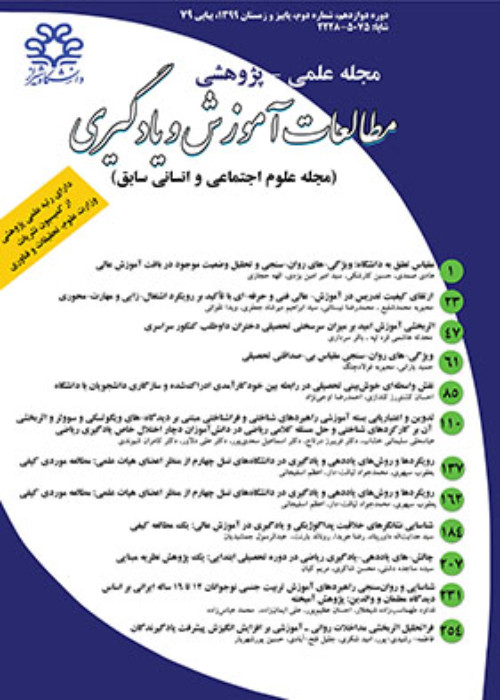The Effectiveness of Social Competence Training on Bullying Behaviors, Well-being, and Academic Involvement of Male Students with Bullying Characteristics
Given the importance of enhancing and developing the educational aspects of students who bully others, which includes strengthening their well-being and academic enthusiasm, and considering the advancement of social dimensions and factors, the concept of social competence emerges as a crucial and foundational approach in educational interventions. Its role in mitigating bullying behaviors and reinforcing the well-being and academic enthusiasm of students who bully others forms the fundamental challenge of this research. This study seeks to answer whether training in social competence effectively impacts the bullying behaviors, well-being, and academic enthusiasm of students who bully others. There exists a significant gap in experimental research regarding the effectiveness of social competence on bullying behaviors, well-being, and academic enthusiasm of students who are bullied. The intervention and training of social competence for students who bully others could be seen as a promising strategy in improving the bullying behaviors, well-being, and academic enthusiasm of these students. Therefore, given the problem at hand, that bullying among students is a fundamental issue rooted in factors such as the prevalence of bullying behaviors, academic well-being, and academic enthusiasm, there is a need for social competence training in these areas. This study investigates the effectiveness of social competence education on bullying behaviors, well-being, and academic enthusiasm of students who bully others.
The current research was applied in nature and employed a semi-experimental methodology with pre-test and post-test, including a control group. The statistical population comprised male students from the academic year of 2022-2023, who were selected via a random one-stage cluster method from a first-year high school in the 2nd district of Urmia for the purpose of the study. A sample of 30 male students who had been bullied was screened using a standard scale and randomly divided into two groups of 15. The criteria for inclusion in the intervention were informed consent, having experienced being a victim, and not having other concurrent injuries and disorders. The criteria for exclusion were non-participation in all training sessions. Initially, bullying behaviors, well-being, and academic passion were assessed as a pre-test from the groups under study. Subsequently, ten sessions of Felner's (1990) social competence training were conducted for 60 minutes over a month for the experimental group, while the control group did not receive such training. After completing the training, the post-test scores were obtained using the same standard scales that were coded, and the identity of the respondent was kept anonymous. Descriptive statistics (mean index and standard deviation) and inferential statistics were used to analyze the research results. Inferential analysis was conducted considering that the intervention was carried out on one group with pre-test and post-test, and the study had more than one dependent variable. According to the research hypotheses, the multivariate analysis of covariance test in SPSS-20 was used to analyze the cases.
According to the findings obtained in this research, it can be stated that the research hypotheses are confirmed. Therefore, it can be concluded that bullying behaviors (bullying, conflict, and victimization), academic well-being (valuation, burnout, academic satisfaction, and academic participation), and academic conflict (behavioral, emotional, and cognitive) of students who bully others in the experimental group underwent a significant change under the influence of social skills intervention.
Based on the findings of the present study, social competence training demonstrated a significant effect on bullying behaviors, well-being, and academic involvement of male students with bullying tendencies. In other words, social competence training was successful in reducing bullying behaviors in students who bully others and enhancing their academic well-being and academic involvement.
- حق عضویت دریافتی صرف حمایت از نشریات عضو و نگهداری، تکمیل و توسعه مگیران میشود.
- پرداخت حق اشتراک و دانلود مقالات اجازه بازنشر آن در سایر رسانههای چاپی و دیجیتال را به کاربر نمیدهد.




